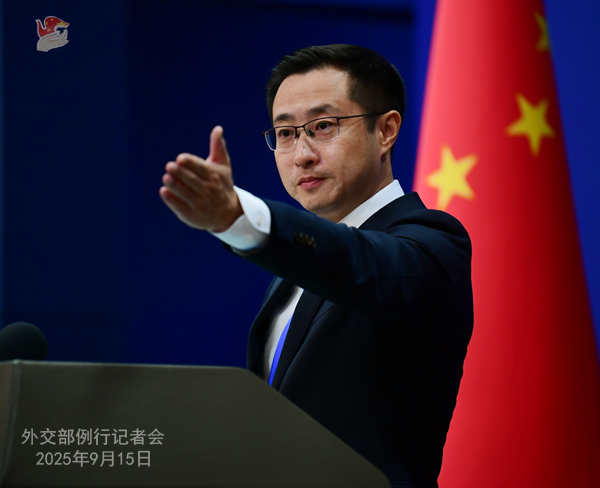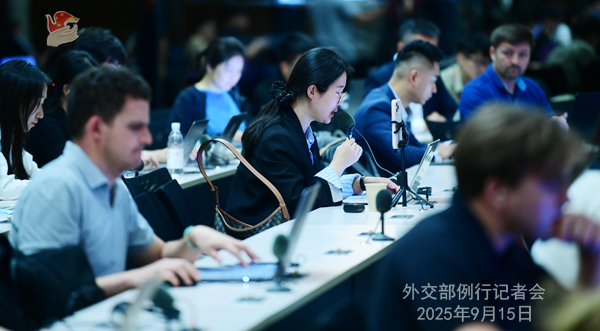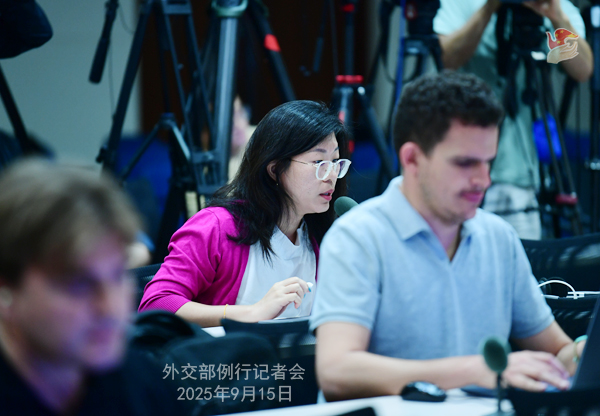
People’s Republic of China


Xinhua News Agency: The U.S. has asked the G7 and NATO to impose additional tariffs on Chinese imports over China’s purchases of Russian oil to facilitate China’s effort in ending the Russia-Ukraine conflict. What is China’s comment?
Lin Jian: It is fully legitimate and lawful for China to carry out normal economic, trade and energy cooperation with all countries, including Russia. What the U.S. has done is a typical move of unilateralism, bullying and economic coercion. It seriously disrupts the international trade rules and threatens the security and stability of the global industrial and supply chains. Facts have proven that coercion and pressure win no hearts and minds, still less will they solve anything.
China’s position on the Ukraine crisis is consistent and clear. Dialogue and negotiation is the only viable way out of the crisis. China has, since day one, held an objective and just position and promoted talks for peace.
China firmly opposes relevant party directing the issue at China and abusing illicit unilateral sanctions and long-arm jurisdiction against China. If China’s legitimate rights and interests are harmed, China will resolutely take countermeasures to safeguard our sovereignty, security and development interests.
China-Arab TV: Pakistani President Asif Ali Zardari pledged on Sunday stronger cooperation with China on defense production. The strikes in Qatar exposed problems of the U.S.’s security commitment. Will more countries consider and seek stronger connection with China on defense production and security cooperation as a way of international cooperation with more respect and different from the U.S.’s way?
Lin Jian: China advocates the vision of common, comprehensive, cooperative and sustainable security. We stand ready to work with all parties to jointly implement the Global Security Initiative, strengthen international security cooperation, uphold the purposes and principles of the UN Charter, safeguard the international order based on international law, and build a world of lasting peace and universal security.
CCTV: During his recent visit to the U.S., Chiu Chui-Cheng, head of the Mainland Affairs Council of China’s Taiwan region, met with both Democratic and Republican members of the U.S. Congress and delivered a speech at the U.S. think tank the Heritage Foundation. Chiu said, “Mainland China has become the greatest threat to the peace and stability across the Taiwan Strait,” and sought to play up the possibility of Taiwan being taken over by the Mainland by force. He also thanked the U.S. for the reaffirmation of its commitment to Taiwan. What is your comment?
Lin Jian: There is but one China in the world, and Taiwan is an inalienable part of China’s territory. This is the true status quo regarding the Taiwan Strait. The greatest threat to peace and stability across the Taiwan Strait comes from the separatist activities of “Taiwan independence” forces and the external connivance and support they receive. China firmly opposes any form of U.S.-Taiwan official interactions and military contacts, and firmly safeguards our nation’s sovereignty and territorial integrity. We urge the U.S. to earnestly abide by the one-China principle and the three China-U.S. joint communiqués, and stop sending wrong messages to “Taiwan independence” separatist forces. No matter how the DPP authorities peddle the “mainland threat” narrative, hype up tensions across the Taiwan Strait, and squander the taxpayers’ money in exchange for external support for their “independence” agenda, they cannot change the fact that both sides of the Strait belong to one and the same China. Still less can they stop the inevitability of China’s reunification.
Our message to Chiu Chui-Cheng and his kind: To hustle national interests for “Taiwan independence” brings only shame and contempt. Their attempts are doomed to fail.
AFP: According to some media reports, Chinese leader has invited his U.S. counterpart Donald Trump to visit China this year, but the U.S. side has not responded due to disagreements over trade and fentanyl. Would the Foreign Ministry like to comment on this? Is a leader summit in China by the end of the year something the Chinese delegation in Madrid for the ongoing talks will raise with the U.S. side?
Lin Jian: China and the U.S. have open channels of communication. On your specific question, I have no information to share.
China News Service: It’s reported that U.S. Secretary of State Marco Rubio said in a statement that the U.S. stands with its Philippine ally in rejecting China’s destabilizing plans to establish a “national nature reserve” at Scarborough Reef. He said this is yet another coercive attempt to advance territorial and maritime claims in the South China Sea at the expense of its neighbors. He called upon China to abide by the 2016 Arbitral Tribunal’s decision. What’s China’s comment?
Lin Jian: China made its position clear on that issue last week, and made a serious protest to the U.S. today over the wrongful remarks. Huangyan Dao has always been China’s territory. It is China’s sovereign right to create a national nature reserve for the island, which is legitimate, lawful, and beyond reproach.
With the joint efforts of China and ASEAN countries, the South China Sea has been generally stable. The U.S. is not a party to the South China Sea issue, but has repeatedly made irresponsible remarks, caused problems and meddled in the maritime issues between countries concerned. The U.S. has also brought in individual countries to sow discord and fear and disrupt the South China Sea which has otherwise been tranquil all along. The “arbitration” that you mentioned is nothing but a political farce orchestrated by the U.S. masqueraded as a legal process. The so-called “decision” is illegal, null and void, and is not binding. China does not accept or recognize it. Who’s committed to defending the international rule of law and a peaceful and stable South China Sea, and who’s been a disruptor and troublemaker? The answer is quite clear.
The U.S. should keep its hands off the South China Sea, the hands that have been the source of disinformation, tension and confrontation, and give the South China Sea its tranquility back. China will continue to work with ASEAN countries to fully and effectively implement the Declaration on the Conduct of Parties in the South China Sea, actively move forward consultations on the Code of Conduct in the South China Sea, and jointly build the South China Sea into a sea of peace, friendship and cooperation.
Reuters: U.S. Democrats have asked the Trump administration to press China to curb overproduction, saying any bilateral trade deal should include “binding requirements” on Beijing to reduce industrial overcapacity. This was seen in a letter from members of the House Select Committee on China. What is China’s response to this?
Lin Jian: We’ve stated more than once that the so-called “China’s overcapacity” narrative has no basis in fact or economic laws. It is just a false pretext for protectionism, and its real aim is to hold back China’s high-quality development. We firmly oppose it.
CCTV: It’s reported by the ROK media that ROK Foreign Minister Cho Hyun will visit China this week. Could the Foreign Ministry confirm that?
Lin Jian: At the invitation of Member of the Political Bureau of the CPC Central Committee and Foreign Minister Wang Yi, ROK Foreign Minister Cho Hyun will visit China on September 17.
The Paper: We noted that the opening ceremony of the 2025 Cybersecurity Week was held this morning in Kunming. What does China hope to achieve through the Cybersecurity Week and what’s China’s stance on dealing with the common challenge of cybersecurity?
Lin Jian: The nationwide events of Cybersecurity Week held annually in China aim to raise public awareness on cybersecurity, help internet users become more capable of ensuring online security, foster a healthy and positive environment in cyberspace, and promote global cybersecurity governance and cooperation.
Cybersecurity threats are the common challenge faced by all countries and upholding cybersecurity is the shared responsibility of the international community. China actively advocates a peaceful, safe and secure, open, cooperative and orderly cyberspace. We are committed to promoting a community with a shared future in cyberspace, and will continue to work with the international community to jointly uphold cybersecurity, so that the internet can deliver more benefits to people from all countries.
AFP: On the U.S.-China trade talks in Madrid, is China considering the option of allowing ByteDance to sell its controlling stake in TikTok, something that the U.S. side has demanded before the app could be banned in the U.S. after Wednesday if there is no solution?
Lin Jian: China has stated its position on issues related to TikTok on multiple occasions.

Global Times: It’s reported that since August this year, under the excuse of cracking down on drug cartels in Latin America, the U.S. deployed warships and a nuclear-powered submarine to the Caribbean and waters off the coast of Venezuela. Venezuela recently said that a U.S. destroyer illegally intercepted, boarded and detained a Venezuelan fishing boat in the country’s EEZ. What’s China’s comment?
Lin Jian: Recently, in the name of combating drug trafficking, the U.S. has deployed forces in the waters of the Caribbean sea off Venezuela, and claimed to have sunk a Venezuelan vessel, shot dead sailors, and intercepted and detained a Venezuelan fishing boat, resulting in continued tensions in the region. The U.S.’s moves threaten regional peace and security, severely infringe upon other countries’ sovereignty, security and lawful rights and interests, and seriously violate international law.
China supports the effort of cracking down on transnational crimes through stronger international cooperation, opposes the unilateral abuse of force and is against external interference in Venezuela’s internal affairs under any pretext. We urge the U.S. to stop undermining countries’ safety of navigation and their freedoms and rights enjoyed under international law, and stop disrupting regional peace and stability under the pretext of combating drug trafficking.
Reuters: The American Institute in Taiwan said in a statement that mainland China intentionally mischaracterizes documents from the World War II era, including the Cairo Declaration, the Potsdam Proclamation, and the Treaty of San Francisco, to try to support its campaign against Taiwan. They also said that Beijing’s narratives are “simply false, and none of these documents determined Taiwan’s ultimate political status.” What is the Foreign Ministry’s comment to this?
Lin Jian: The statement of relevant U.S. institution seeks to distort the facts and mislead the public. China strongly deplores and firmly opposes this.
The restoration of Taiwan to China is an important part of the outcomes of WWII victory and post-war international order. A series of instruments with legal effect under international law, including the Cairo Declaration, the Potsdam Proclamation, and the Japanese Instrument of Surrender, have all clearly affirmed China’s sovereignty over Taiwan. The question regarding the status of Taiwan has already been completely settled following the victory of the War of Resistance against Japanese Aggression in 1945. The so-called Treaty of San Francisco is a document that is illegal, null and void, and issued by the U.S. and some countries after WWII, excluding the People’s Republic of China and the Soviet Union, to seek a separate peace deal with Japan.
Let me stress that there is but one China in the world and Taiwan is an inalienable part of China’s territory. This is an undeniable historical and legal fact, which no one or force can change. We urge the U.S. to abide by the one-China principle and the three China-U.S. joint communiqués, and stop abetting and aiding “Taiwan independence” separatist forces in any form.
Beijing Daily: The China International Fair for Trade in Services (CIFTIS) concluded in Beijing yesterday. Foreign media commented that over the past 13 years since its launch, CIFTIS has realized extraordinary transformation as China’s trade in services continued to grow. This year’s CIFTIS not only offers a window displaying global trade in services, but also highlights China’s dynamism of opening up and innovation influence in the global economic landscape, demonstrating China’s firm commitment to high-standard opening up. What is your comment?
Lin Jian: The China International Fair for Trade in Services (CIFTIS), which was launched 13 years ago, is an important platform provided by China for wider opening up, deeper cooperation and greater innovation. This year’s CIFTIS attracted close to 2,000 companies to exhibit on-site, over 20 percent of which are international companies, covering 26 countries and regions that are among the top 30 in terms of services trade, and displayed 198 new products and outcomes. As scientific and technological development and industrial transformation in the world accelerates, the annual CIFTIS effectively meets the urgent needs of countries for developing high-quality services trade.
Recently we also successfully held the World Smart Industry Expo 2025, the 25th China International Fair for Investment and Trade, and other expos and fairs, sending a clear message of China enhancing innovation cooperation and jointly responding to challenges with other countries. China will, as always, act as a promoter of economic globalization, a defender of the multilateral trading system, and a contributor to stable and unimpeded industrial and supply chains, share the long-term benefits of greater institutional opening up with other countries, and provide stability and new impetus for the world economy.
Reuters: A question about U.S. Treasury Secretary Bessent’s comments that came out just now. About the trade talks happening in Madrid, he has said that China has come to them with a very aggressive ask and that the U.S. is not willing to sacrifice national security. Could we clarify what the aggressive ask is? And another point that he made is on the TikTok deal, he said that the talks are really close to resolving the issue. Can we confirm that?
Lin Jian: With regard to the trade talks between China and the U.S. in Madrid, I have no information to share at the moment. You may continue following the talks. On TikTok, China has stated its principled position on multiple occasions.
Ukrinform News Agency: U.S. President’s Special Envoy for Ukraine General Keith Kellogg, speaking at a security forum in Kyiv last Saturday, said that if China stopped supporting Russia, first of all economically, it would lead to a very quick end to Russian aggressive war against Ukraine. Would the Foreign Ministry like to comment on this?
Lin Jian: On the Ukraine crisis, China holds an objective and just position, and has worked actively to promote peace talks. Most countries, including the U.S. and those in Europe, continue to trade with Russia. The normal exchange and cooperation between Chinese and Russian companies are in line with WTO rules and market principles. They don’t target any third party and should not be interfered or affected.
Beijing Youth Daily: China held another successful China-Africa Youth Festival last week, which is the 9th consecutive edition of the event. Can you give us more details?
Lin Jian: The China-Africa Youth Festival is a flagship project for youth exchanges under the framework of the Forum on China-Africa Cooperation (FOCAC). With the joint support from both sides and active participation of youngsters, we’ve staged nine successful editions of the China-Africa Youth Festival. This year’s events were held in Beijing and Qinghai from September 8 to 13. A total of 59 young representatives from countries including African member countries of the FOCAC made field trips and attended exchange events to gain first-hand experience of the achievements in China’s modernization drive and an eco-friendly and culturally rich China where all ethnic groups co-exist in harmony and people live a better life. The experience has made participating youngsters more committed to China and Africa jointly pursuing modernization.
Cultural and people-to-people exchange is an important part of China-Africa cooperation in the new era. Such exchanges are conducive to deepening mutual understanding between Chinese and African people, and carrying forward traditional friendship between China and Africa. Through this year’s festival, China stands ready to further consolidate solidarity and friendship between Chinese and African youth and inject new impetus from the youngsters to the effort of building an all-weather China-Africa community with a shared future for the new era.
AFP: Mexico’s President Claudia Sheinbaum last week said that there will be talks with China this week about planned tariffs of up to 50 percent on Chinese goods. Does the Foreign Ministry have an update on those talks? When and where they will take place and who will take part?
Lin Jian: China advocates a universally beneficial and inclusive economic globalization. We stand against all forms of unilateralism, protectionism and discriminatory and exclusionary measures. China firmly opposes moves taken under coercion to impose restrictions on China or hurt China’s legitimate rights and interests under whatever pretext. China will firmly defend its rights and interests in light of the developments of the situation.
China and Mexico are both important members of the Global South and our economic and trade cooperation is win-win in nature. China values its relations with Mexico and hopes that Mexico will work with China to jointly uphold a sound global trade environment.




